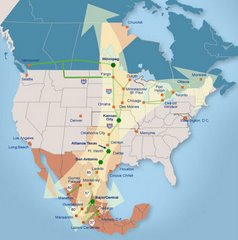
I am sad to see the unity between anti-toll groups eroding. While Texas Anti-Toll groups are split on whether SB792 is a compromise or a moratorium, their foes are moving on with business as usual.
We Texans are caught up in a plan to connect North America. The TTC is just were it starts (after all, we are the largest state and our former Gov. is now President). NASCO is but one example of the private interests that are influencing how Texas transportation policy is being made.
It is extremely important that Anti-Toll/TTC groups unit if there is to be any chance of slowing down this snowball that has been building for over a decade.

Beginning today,
TxDot and NASCO (North America’s SuperCorridor Coalition) are hosting it's 3rd annual three-day conference in Fort Worth, TX. According to the NASCO program flyer, next year the conference will be in Guanajuato, Mexico, June 4-6, 2008.
More than 350 transportation, logistics and economic development specialists from the United States, Canada and Mexico are attending the meeting.
The nonprofit coalition, whose members include public- and private-sector organizations, wants to develop an integrated transportation system linking the three countries.
It is reported that NASCO has received $2.5 million in earmarks from the U.S. Department of Transportation to plan the NAFTA Super Highway. Their own website reveals how they have been actively involved in shaping our federal transportation legislation.
For over ten years, NASCO has been developing a strong coalition of cities, counties, states, Canadian provinces, and private sector companies to lobby for federal funding and promote a "SuperCorridor" to address the transportation, trade and security needs of the three NAFTA nations.
We have succeeded in bringing hundreds of millions of dollars to the NASCO I-35 Corridor, resulting in High Priority Corridor status for I-35 in 1995 under the Intermodal Surface Transportation Efficiency Act (ISTEA). In addition, we successfully lobbied for the creation of two new categories under the Transportation Act of the 21st Century (TEA-21) – the National Corridor Planning & Development Program and the Coordinated Border Infrastructure Program.
The NASCO "SuperCorridor Caucus" was formed on Capitol Hill to promote corridor development and to help secure NASCO legislative initiatives in both the authorization and appropriation processes.
We continue to be recognized as the strongest International Trade Corridor Coalition on Capitol Hill, and we are the only Corridor Coalition with true international representation from the three NAFTA nations."
Additionally, on their website:North America's SuperCorridor Coalition, Inc. supports the Multi-state International Corridor Development Program in S. 1072
In a 1996 study done for NASCO, it was estimated that the corridor needed $2 billion per year in infrastructure improvements over an 18-year period. NASCO supports as high a funding level as possible for the Multi-state International Corridor Development Program to operate as intended.
More
About NASCO





